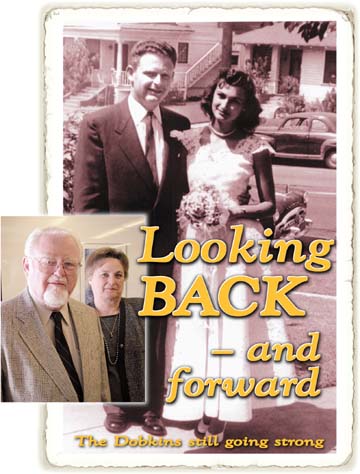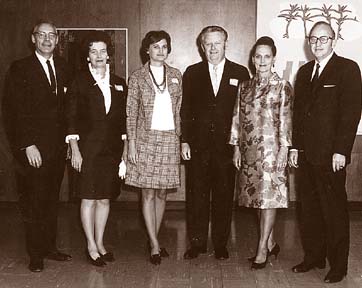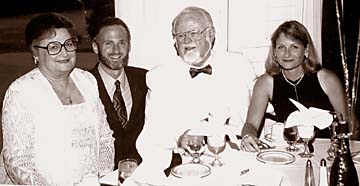|
by GEORGE RINGWALD HE WAS ALWAYS ONE NOTCH AHEAD OF ME," recalls Ronald Young, who was in arts and humanities administration at Humboldt State University before he retired six years ago. "Every time I've seen him teach, he was just very, very effective. At various times I was in the administrative chain on campus, responsible to him ultimately, and he was always helpful to me. He was very helpful in providing signals in a non-obtrusive way to indicate that I might want to think that over before I did anything rash. He managed to direct without being...um...directive." "I don't think we ever had a real disagreement anywhere along the line," muses Richard Ridenhour, a young-looking 70, who started out at HSU "down in Natural Resources and Fisheries," as he puts it, and who later became Dean of Academic Affairs. Picking up on his opening comments, he went on: "He was always very supportive of me, offered to support any effort I had to go further in the administration. He supported me when I sought to be dean of the College of Natural Resources, which I was in later years." "We've been very close, said Robert Dickerson, 81, who taught economics at HSU. (Incidentally, Dickerson will tell you that, "we're in deep trouble" economically today.) "We're both Homer's boys, you know," he points out. "And there are a lot of us. In fact, Homer went out and hired all of us -- Homer's boys and Homer's girls as well. Because he had a belief what education was." (The late Homer Balabanis, known as Mr. Humboldt on the HSU campus, was a Vice President of Academic Affairs who retired in 1964 after a 41-year tenure.)
Bette and Milt Dobkin, center in the early 1970s at Humboldt State College, as it was called then. A DISTINGUISHED CAREER The subject of all these affections from his HSU cohorts is, of course, Milt Dobkin. He may have been one of Homer's boys, but he is also very much his own man. In his 26 years on the HSU campus, he had a distinguished career as Vice President of Academic Affairs; he went to Sacramento for three years in the Chancellor's office as a consultant and statewide dean for faculty affairs; he served as interim acting president between the presidential tenures of Cornelius Siemens and Alistair McCrone; and he was himself a candidate for the HSU presidency. All this, and yet he was without the sine qua non of academia -- a Ph.D. "When I came to Humboldt in 1955," he recounts, "I had two other competing offers from institutions in California. All three wanted someone to start and develop a forensic [debating] program. I think it was as a result of that and my prior experience as a secondary school teacher that [HSU] offered me the position. They said, `In your case we won't require the doctorate for tenure promotion.' And that was in writing." A native of Los Angeles, Dobkin remembers that he paid nothing when he went to Los Angeles City College. This was right after World War II, and the GI bill helped him scrape through. (He served in the U.S. Navy during the war.) His parents, he relates, were both devoted to culture, but had no means to help him. He got a job making 37.5 cents an hour working at the public library. Later, the National Youth Administration, a New Deal program, came along to help students working on campus. "And that paid 25 cents an hour," he abds with a wry laugh. One result of that experience is that he's gung-ho about keeping down the costs of higher education. Student fees were very low, he recalls, when he first came to HSU, "based on the premise that the state provided a great deal of value by providing open access to higher education." He adds, "but gradually the state has moved toward higher and higher fees, which really limits access and is kind of cutting off the nose to spite the face -- because the state benefits so much from an educated population. Student fees should be kept to the bare minimum. The cost for other things, books for example, has become astronomical. It's not unusual to have to pay $75 for a text book." Dobkin likes to say: "There's nothing more expensive than ignorance." `SCANDALOUSLY' COURTING BETTE Milt and Bette Dobkin, who celebrated their 50th wedding anniversary this past August, live in an Arcata hillside home of multi levels and comfortable furnishings. The story goes, according to one source, that Milt "scandalously courted Bette." That gets another laugh from Milt. "The age difference, which now has shrunk with age, was a gaping chasm back in those days," he remarks. "I was a high school teacher -- not at her high school -- and director of forensics at the high school where I taught. She was a debater for a different high school [in the L.A. area], and we began dating just before she graduated from high school, just about the time she turned 17, and I was 30. In those years high school teachers didn't date high school students. We had to keep it under wraps, and when it was announced that we were getting married, there was a lot of um clucking." Of the uniting of 17 and 30, he notes: "That's a far greater gap than 67 and 80." At any rate, scandalous or not, it has been a life long love story for the two of them. A CAREER OF HER OWN Bette (nee Mattison) Dobkin is the managing broker at Coldwell Banker Sellers Realty in Arcata. As the broker of record, she supervises the activities of the people who work there, checking contracts, closing papers, etc. She also still does some selling and listing on her own. Bette Dobkin is also active in a host of community affairs. She has been president of the Arcata School District board of trustees, and is now chair of the board for the Arcata Recycling Center, which, she is careful to point out, "is the oldest community recycling center in the United States." She's been Realtor of the year and is an honorary director for life for the California Association of Realtors. She has also served for many years on the board of the North Coast Repertory Theatre. She and Milt were married in 1952, but she figured that shouldn't keep her from working, helping with the family finances. "And where do you work if you're young (she was 19 at the time) and not skilled? You work in one of the department stores being a salesperson." But a good girl friend, whose mother was a real estate broker, told her: "All you have to do is get a license, and if you sold one house during the summer, you would make way more money than spending the whole summer putting fat ladies in a bathing suit." And Bette Dobkin thought, "Well, that sounds pretty good." That was the beginning of her real estate indoctrination. "I taught at Humboldt at night -- speech communications -- while they were babies," she says, referring to their two children, Donn and Beth. And in the mornings, she would teach classes at the elementary school. She kept at this routine for more than 10 years, and it wasn't until 1975 when she landed her job with the firm -- Sellers Realty -- that Frank Sellers founded. Was there any conflict between their jobs -- hers and Milt's? "Well," she responds, "Milt sometimes says that he only wants to be treated as well as I treat my customers here." She bursts into laughter, as she frequently does. She exudes effervescence.
ALMOST THE PRESIDENT Milt Dobkin tells about his abortive attempt to become president of HSU. "In fact, I was considered twice," he relates, "and both times I was in the final three. Both times I was interviewed by the board of trustees, and both times my wife warned me that I had no chance." He breaks into a laugh. "The board," he goes on, "has always been politicized to one extent or another. And in those days there was a great antagonism between certain elements of the business community and the university. It's not a matter of blame; it's a matter of perception. As a matter of fact, the Times-Standard ran an editorial saying I should be appointed, much to my surprise." He gets a laugh out of that too, and adds, "It probably didn't do me any good either." As it happened, Bette Dobkin was vice chair of the Humboldt County Grand Jury at the same time Milt Dobkin was running for president. In those days, the board interviewed the spouses of candidates, which was how Bette came to know her husband's chances were, as they say, slim to none. With the Grand Jury foreman out of town, it fell to Bette Dobkin to sign the report -- a report that recommended that the Humboldt County Board of Supervisors drop out of an organization called the Eel River Conservation Association. The group had an environmentally friendly name but was not necessarily friendly to the environment, as its support for a controversial dam project at the time demonstrated. Bette's role in the report led one of the trustees to suggest that she was "a rabid environmentalist." "That's what they said," she says with another happy laugh. "It was so funny in those days; it's hard to think back now to what it was like then. I cannot imagine today that a board of directors or trustees would interview a wife when they didn't interview husbands. A female could be a candidate, but they didn't interview her husband. Wives were supposed to be sort of thrown in for free. "I did resent being interviewed," she goes on, "but I didn't want to interfere with Milt's chance. I tried to cooperate, and then they said, `What groups do you belong to?' I said, `Well, the PTA, Faculty Women, League of Women Voters' `What other groups?' `Well, there weren't any other groups,' I said. And they said, `You're an environmentalist!' I said, `Well, I just believe in protecting the environment. What do you mean? They didn't know what to do, so they stopped." Bette said that her environmental views were "a major thing in some people's minds" and "didn't help" her husband's bid to become HSU president. She said another factor may have been Milt's outspokenness. "He was always standing up for faculty and for the university in defiance of the chancellor of the university [system], so there was a question if he would have been acceptable to the chancellor himself." Milt Dobkin doesn't voice any regrets about the loss of the presidency, but one of his faculty friends, Richard Ridenhour, had this to say: "I'd have loved to see him in the position. I think he would have made an excellent president. His whole persona was well-suited to the position." HELPING MCCRONE That persona was also important to helping others up the rungs. "I think Milt did a tremendous amount to make Alistair McCrone's presidency successful," says Ron Young. "He kept the president filled in on the campus situation. He had an ability to read people and to read the campus, which I don't think President McCrone was ever particularly good at. The president gave the impression, to most people, I think, that he didn't want to hear any bad news. If there were problems, he didn't want to know about it. And I think Milt was singularly successful in being able to communicate; he got it to him in an acceptable manner." (Small coincidence: The Alistair McCrone home is across the street about three houses down from the Dobkin residence.) Asked how he would grade HSU today, Milt Dobkin had this to say: "It was built on the concept that teaching, particularly in the undergraduate level, was the primary purpose of the institution. And in that respect it grew rapidly. When I came to Humboldt, it was a very small school, very small college. Maybe 800 FTE [full-time equivalency] students, and of that 85 percent were local. Now it's exactly reversed -- 85 percent from other outlying areas of the state, and 15 percent local. In the process, the reputation of the institution grew. It's a place of choice for anybody with a strength that others don't have. It's a first-rate humanities and arts campus." One current view of learning questions the obligation of a university to educate a student even if he or she doesn't want it. Dobkin, not surprisingly -- given his background as a debater -- is quick to take issue with that idea. "I would say that's a general obligation of anybody who chooses to be a teacher," he asserts. "The responsibility is to reach those who don't want to learn and stimulate them to learn. Not a lot of people share that point of view; some of them have nothing to do with education and some of them are faculty and some are administrators. My view is you don't waste a human resource, and you have an obligation to try to stimulate the actual act of learning." Roscoe (Rocky) Peithman, a slightly grizzled old-timer (he'll be 90 come February) who speaks in a kind of gravelly voice, was a physics professor and worked for a year under Milt Dobkin, then Vice President for Academic Affairs. He remembers Dobkin as a man with an ability to "get faculty to do the things that had to be done; he just got people to do that." Peithman himself is remembered as one of the old Buffalo Heads on the campus during President Siemens's tenure, which ran from 1950 to 1973. They saw it as their duty to keep Siemens in line, so to speak. "After all," said Peithman, "the president is powerful, and sometimes if he misused that power, some of us had to go in and talk to him about it." Milt Dobkin lays claim to coining the name. "When I was a young and fiery assistant professor," he relates, "I used to go to Association of State College Instructors meetings, and it occurred to me that whenever some younger faculty member would come up with an idea, some old-timers, senior professors, would go like this" -- and he mimics the shaking of a shaggy buffalo head -- "and I thought this a typical buffalo head approach. That was the genesis of it." That description, however, Dobkin goes on to say, didn't fit Rocky Peithman. "He was always open to innovations, to new ideas." Milt Dobkin officially retired on the faculty early retirement program in 1983, but continued in his vice presidency capacity for another year at President McCrone's request. THEIR BUSY RETIREMENT Still, it seems ridiculous to talk about the Dobkin "retirement." This is how he keeps busy: He is now in his fourth term as a member of the College of the Redwoods board of trustees, having served one year as president; for many years he has been active in building an organization of retired faculty at California State University -- the California State University Emeritus and Retired Faculty, which now has a membership of about 3,000; he also serves as retiree representative of the California Faculty Association board; he has himself served as Grand Jury foreman; and he has also been president of the General Hospital Advisory Board, Hospital Corporation of America. Oh, yes, I forgot to mention that he is currently California Faculty Association representative to CalPERS -- the California Public Employees' Retirement System. As it happened, last month when he was interviewed he was going to that organization's monthly meeting in Sacramento (Oct. 9), and then on to another committee meeting for California Faculty Association in Los Angeles two days after that. Not to be outdone, Bette Dobkin was going to a meeting of the California Association of Realtors down south, plus taking a couple of days to visit their grandchildren. No dull life for the Dobkins. Conviviality is part of the game too. Richard Ridenhour recalls: "I really didn't have that much contact on a social basis with Milt. Probably the most was when we were going down to the Chancellor's office on an administrative trip." He adds: "Milt knew Los Angeles like a taxi driver, and you could always count on him for two things: to pick an excellent place to eat, and to make an excellent choice of the wine."
Veteran journalist George Ringwald lives in Eureka. IN THE NEWS | ELECTION RESULTS | CALENDAR
Comments? E-mail the Journal: [email protected] © Copyright 2002, North Coast Journal, Inc. |



